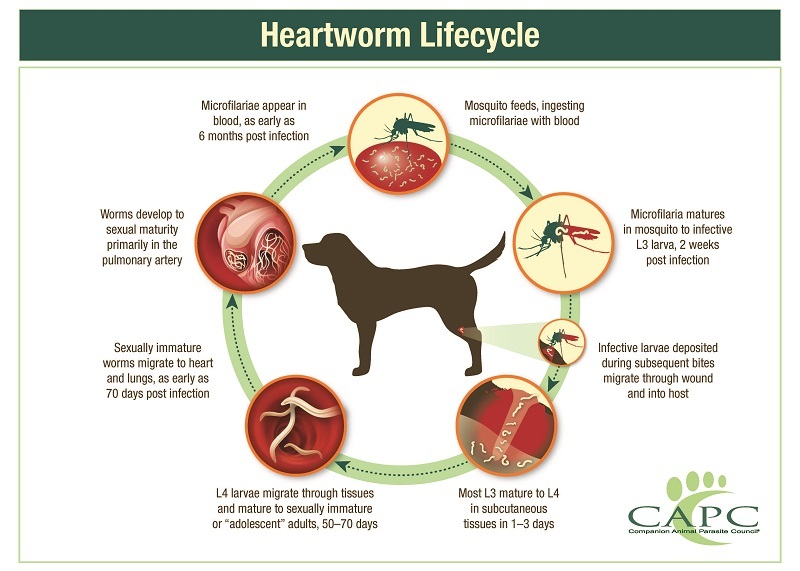Heartworm Disease has been a rampant problem in parts of the US for more than two decades. While the incidence in dogs in Washington State remains very low, it is rising. To help prevent this serious disease (and also control intestinal parasites), Fairhaven Vet has already been recommending monthly, year-round preventive medication (Interceptor Plus) for all dogs for the past several years. We now believe that yearly testing is also in the best interest of our canine companions.
Heartworm is transmitted from dog to dog via Mosquito bites. A microscopic larvae is ingested when a mosquito bites an infected dog. This larvae matures in the mosquito, then can infect another dog when the mosquito bites again. Previously, our cool weather limited this mosquito transmission as the microscopic larvae cannot mature in cool temperatures.
But, parasitologists now believe that temperatures in Washington State can now clearly allow mosquito transmission during our warmer months. This, combined with a significant influx of dogs from heartworm endemic areas, could put local dogs at risk. Fairhaven Vet alone diagnosed and treated 6 dogs last year that had moved here from endemic areas.
Heartworm disease can be debilitating and deadly. Heartworms live in the heart and large, central blood vessels, impairing the heart’s function and affecting the lungs. Treatment, while usually effective, is expensive, has significant health risks, and is painful. After two-months of pre-treatment medications, dogs must receive multiple, deep-muscle injections of a drug that causes significant inflammation. If the heartworms are killed too rapidly, they can shower the lungs leading to potentially life-threatening respiratory disease. Strict confinement is necessary for two-full months after treatment to minimize complications.
At your next annual wellness visit with your dog, the veterinarians and nursing staff at FVH will recommend an inexpensive annual blood test to ensure that Heartworms are not present. Hopefully, between routine testing and preventive medication, we can prevent this disease from affecting any of our beloved canine companions!
More information can be found at the American Heartworm Society’s website: https://www.heartwormsociety.org/pet-owner-resources
You can also view state by state prevalence rates via the Companion Animal Parasite Council: https://capcvet.org/guidelines/heartworm/


